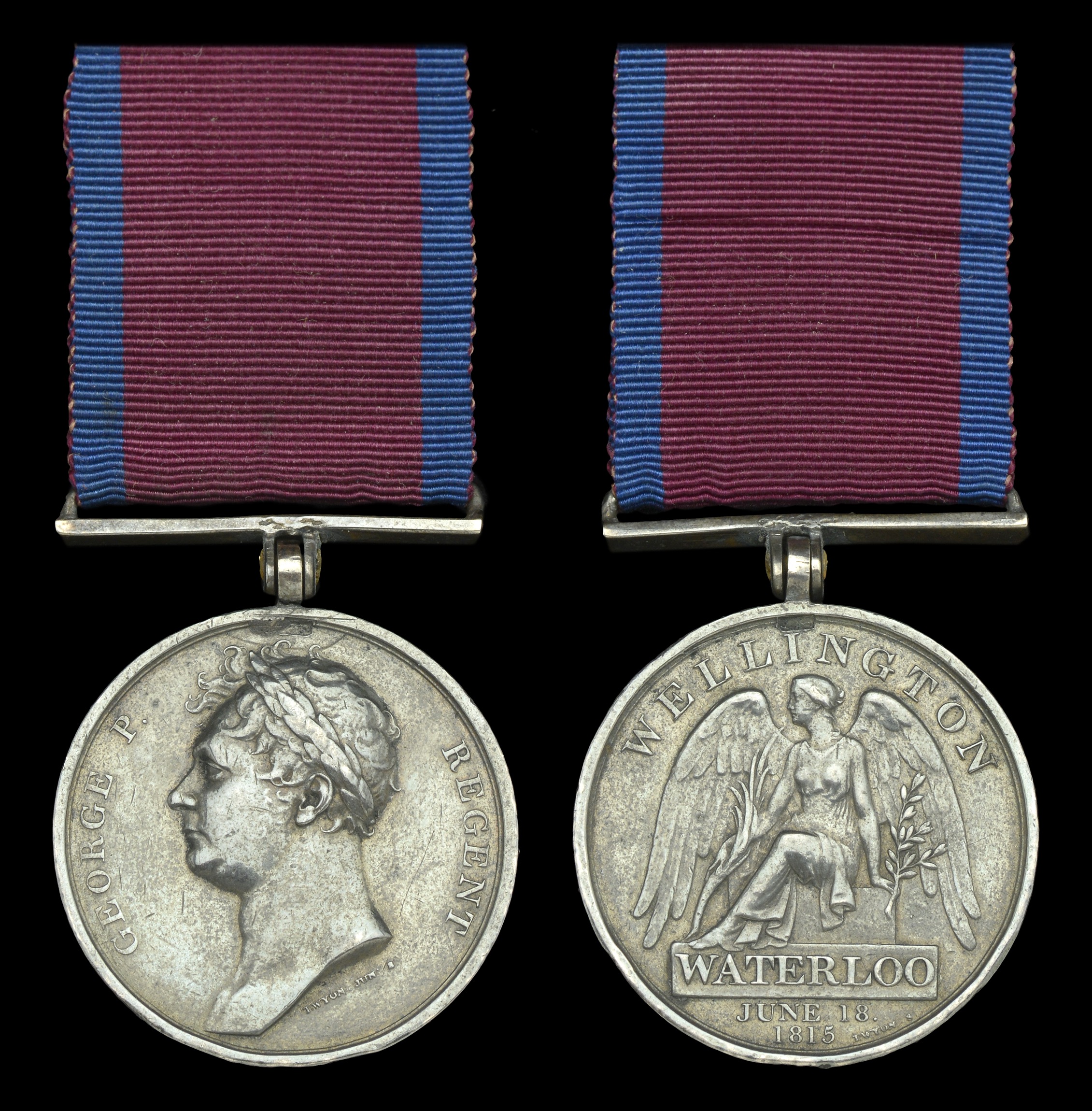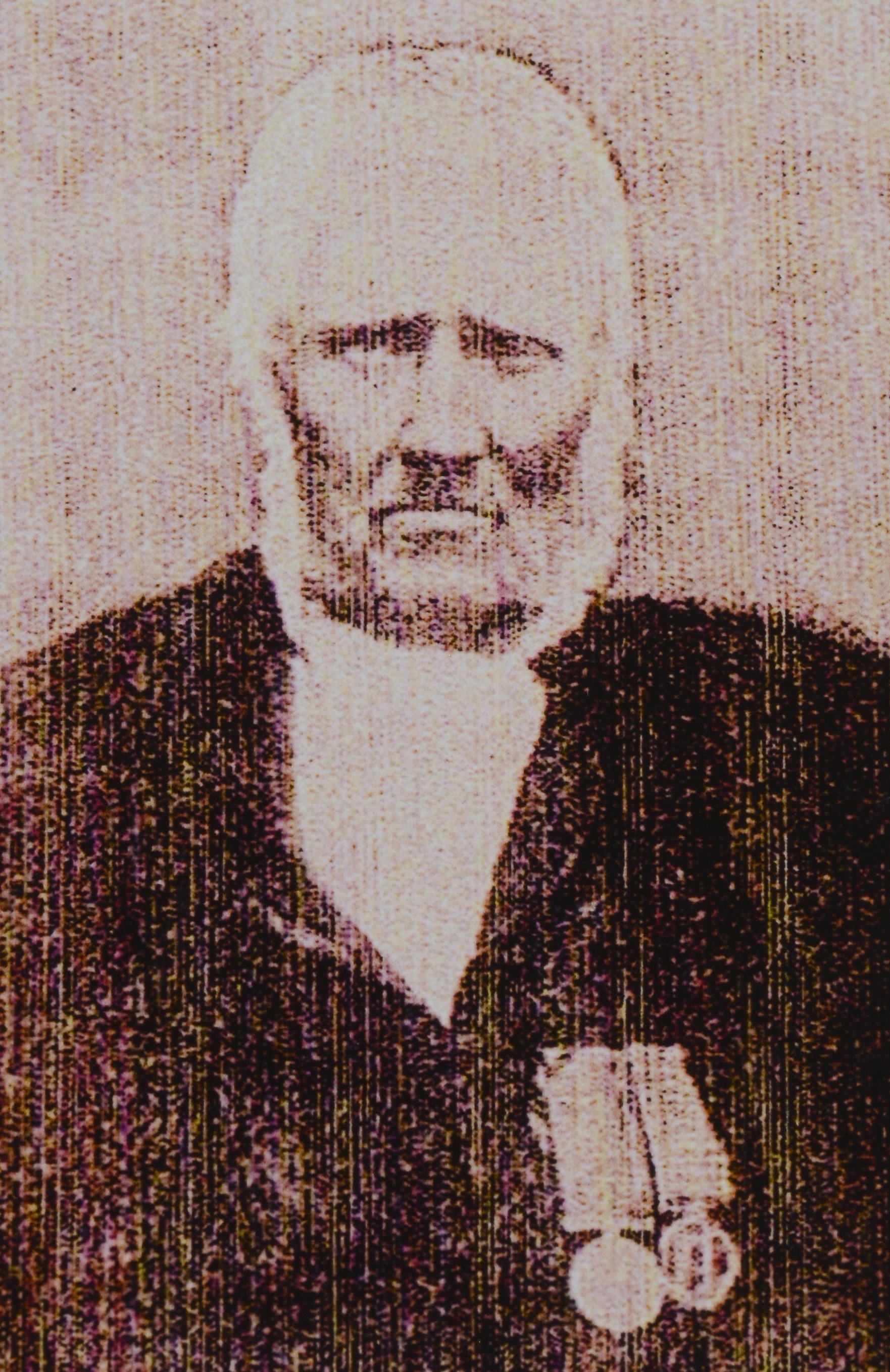213
The Waterloo medal awarded to Corporal Samuel Whitehead, 2nd Battalion, 3rd Regiment of...
Bids do not include VAT, buyer’s premium or delivery.
By confirming your bid, you agree that you have read and accepted the-saleroom.com and the auctioneer's terms and conditions. Confirming your bid is a legally binding obligation to purchase and pay for the lot should your bid be successful.
Choose one of the quick bid options below:
Bids do not include VAT, buyer’s premium or delivery.
By confirming your bid, you agree that you have read and accepted the-saleroom.com and the auctioneer's terms and conditions. Confirming your bid is a legally binding obligation to purchase and pay for the lot should your bid be successful.
Waterloo 1815 (Corp. Sam. Whitehead, 2nd Batt. 3rd Reg. Guards.) fitted with contemporary replacement silver ring and straight bar suspension, light edge bruising and contact marks, otherwise nearly very fine £2,800-£3,400
---
Samuel Whitehead was born on 2 December 1777, at Ilkeston, Derbyshire, and enlisted into the 3rd Foot Guards at Nottingham on 28 August 1798, aged 21 years, a frame work knitter by trade. He served at the Helder 1799, Egypt 1801, Copenhagen 1807, and in the Peninsula from 1809 to May 1811, and was present at Oporto, Talavera, Busaco, and Fuentes d’Onor where he was severely wounded and consequently took no further part in the Peninsular war. Whitehead was discharged in 12 May 1818, with a pension of one shilling and two pence per day. His discharge papers note that him being ‘old and worn out and wounded in the breast in action with the enemy at Fuentes d’Onor 5th May 1811.’
Now aged 40, he returned to his old home where local records suggest that he opened a druggists shop at the bottom of Bath Street in Ilkeston. He also became a Sunday School teacher under the Curate Richard Moxon, and in 1842 took up the post of Parish Clerk, holding it until he retired at the end of 1863.
In July 1832 he married Lois Ellis, daughter of Edward and Sarah Ellis. Lois was nearly thirty years his junior. Samuel died on 27 October 1870, aged 92, and was followed 2 years later by his wife. They are buried together in St Mary’s graveyard extension at Ilkeston where their gravestone is inscribed:
‘In loving memory of Samuel Whitehead, late Corpl. of H.M. 3rd Foot Guards and 21 years Clerk of this Parish, born Decr. 2nd 1777. Died Octr. 27th 1870. He served his country in Egypt, at Talavera, Busaco, Fuentes d’Onoro & Waterloo’ (Wellington’s Men Remembered by Janet and David Bromley refers).
Samuel Whitehead’s obituary was published in The Ilkeston Pioneer on Thursday, 17 November 1870:
‘One of the oldest and most respected inhabitants of this parish has just passed away, whose memory will be long and affectionately cherished by all who knew him before age prevented him from discharging the duties of his office. A short memoir of Mr Samuel Whitehead is due to the good old man, and not be unacceptable to many of our readers. In the year 1798, Samuel Whitehead being twenty years old, enlisted in the 1t Battalion of the 3d Foot Guards, and as soon as he had become tolerably proficient in drill he took part in the Duke of York's unfortunate expedition to Holland whence, after suffering very great hardship, he returned safely to England. His regiment returned in such a state, as to clothing and disease, that it was kept for some months in a sort of quarantine. But those were not the days of inaction. Samuel nothing loth, was hurried off on the 1st March 1801, to Egypt, where, on one occasion after landing the work was so hot that twenty-one men of his company were killed or wounded. After the French had evacuated Egypt, Samuel returned to England and had a short interval of rest in London. But in consequence of the panic which came over our nation through fear of invasion, batteries were erected at convenient places, and he was employed during 1804 in setting up those at Chelmsford. In 1805 he went with the expedition to Bremen, but the enemy never showed fight, and he returned to England in February 1806. In 1807 he took part in that comparatively bloodless but important work of transferring the Danish fleet (which by secret treaty had been promised to Napoleon ), from Copenhagen to Chatham. In 1809 he sailed to the Peninsula, and on the 12th May, after a march of 80 miles, reached Oporto, which was taken in three hours, to the mortification of Marshal Soult, who was completely surprised. On the 28th of July he fought in the glorious battle of Talavera; on the 27th September 1810, in the battle of Busaco; on the 5th May 1811, in the sharp contest at Fuentes d'Onor, where he was wounded by a cannon shot in the breast, so severely that he was unable to join the army until the Peninsular war was concluded. In 1814 he was made corporal, and resumed his duties. In 1815 he was again called upon to stand against Napoleon, who had escaped from Elba. He was one of those who were directed to occupy the French at Quatre Bras, so as to detach as many as possible from their main army and prevent them from crushing the Prussians. He used to describe his three days of fighting thus :- "We spent the whole time in corn fields, the wheat crop of which was nearly ripe. It poured with rain during the whole time. We slept in the wet for a few hours when it was dark; at every other moment we were on look out, and fired when we saw any enemy to fire at. We had no food whatever, but a quantity of brandy each day. We did not feel hunger much, and when we awoke we went to our shooting as so much daily work." When the army was massed before Waterloo Samuel Whitehead was chosen to assist the surgeons behind the battle field. In a short time the shot came in so hotly that the ambulance had to retire to the village of Waterloo and the wounded carried nearly a mile. On the morning after the engagement Samuel Whitehead marched proudly with his regiment, but passed the wounded arranged to be served in turn, on his way to Paris. His military life from this time was uneventful, and he left the army altogether on May the 29th 1818, having obtained a pension of one shilling and twopence per day; and having been decorated with a medal and four clasps for Talavera, Busaco, Fuentes d'Onor and Egypt, and with the Waterloo medal, after twenty-one years and eight months, including two years for Waterloo. After this Mr S. Whitehead settled in his native town as chemist and druggist and the regular habits he had acquired as a soldier never left him. Some years after he became a soldier of the cross and was for a long period one of the most punctual Sunday School teachers under the revered Mr Moxon. At the decease of the parish clerk Mr William Tunnicliffe (soon after the Rev G. S. Ebsworth appointed Vicar) the office was offered to him. He discharged his duties with utmost uprightness, and his vicar often observed that in all the multitudinous money transactions between them, Samuel Whitehead was always correct and equally conscientious in all his dealings with the parishioners. His excellent reading, and his fine sonorous voice in singing will not be forgotten by those who attended the church during the time he was connected with it. He resigned his office soon after the old Vicar left Ilkeston, and the congregation testified their respect to him by presenting him with a handsome sum of money. A small pension was also granted him until his death, by a friend who admired his honest worth. His honourable and Christian character has not been without its effect upon his family. They have occupied positions of great trust, and the eldest son, educated at the National School, and thence obtaining a scholarship at the Church training School at Chelsea, has proved by the admission of several Inspectors and Principles of Training Colleges, one of the most successful schoolmasters in the Elementary Schools in our country.’
Sold with comprehensive research.
Waterloo 1815 (Corp. Sam. Whitehead, 2nd Batt. 3rd Reg. Guards.) fitted with contemporary replacement silver ring and straight bar suspension, light edge bruising and contact marks, otherwise nearly very fine £2,800-£3,400
---
Samuel Whitehead was born on 2 December 1777, at Ilkeston, Derbyshire, and enlisted into the 3rd Foot Guards at Nottingham on 28 August 1798, aged 21 years, a frame work knitter by trade. He served at the Helder 1799, Egypt 1801, Copenhagen 1807, and in the Peninsula from 1809 to May 1811, and was present at Oporto, Talavera, Busaco, and Fuentes d’Onor where he was severely wounded and consequently took no further part in the Peninsular war. Whitehead was discharged in 12 May 1818, with a pension of one shilling and two pence per day. His discharge papers note that him being ‘old and worn out and wounded in the breast in action with the enemy at Fuentes d’Onor 5th May 1811.’
Now aged 40, he returned to his old home where local records suggest that he opened a druggists shop at the bottom of Bath Street in Ilkeston. He also became a Sunday School teacher under the Curate Richard Moxon, and in 1842 took up the post of Parish Clerk, holding it until he retired at the end of 1863.
In July 1832 he married Lois Ellis, daughter of Edward and Sarah Ellis. Lois was nearly thirty years his junior. Samuel died on 27 October 1870, aged 92, and was followed 2 years later by his wife. They are buried together in St Mary’s graveyard extension at Ilkeston where their gravestone is inscribed:
‘In loving memory of Samuel Whitehead, late Corpl. of H.M. 3rd Foot Guards and 21 years Clerk of this Parish, born Decr. 2nd 1777. Died Octr. 27th 1870. He served his country in Egypt, at Talavera, Busaco, Fuentes d’Onoro & Waterloo’ (Wellington’s Men Remembered by Janet and David Bromley refers).
Samuel Whitehead’s obituary was published in The Ilkeston Pioneer on Thursday, 17 November 1870:
‘One of the oldest and most respected inhabitants of this parish has just passed away, whose memory will be long and affectionately cherished by all who knew him before age prevented him from discharging the duties of his office. A short memoir of Mr Samuel Whitehead is due to the good old man, and not be unacceptable to many of our readers. In the year 1798, Samuel Whitehead being twenty years old, enlisted in the 1t Battalion of the 3d Foot Guards, and as soon as he had become tolerably proficient in drill he took part in the Duke of York's unfortunate expedition to Holland whence, after suffering very great hardship, he returned safely to England. His regiment returned in such a state, as to clothing and disease, that it was kept for some months in a sort of quarantine. But those were not the days of inaction. Samuel nothing loth, was hurried off on the 1st March 1801, to Egypt, where, on one occasion after landing the work was so hot that twenty-one men of his company were killed or wounded. After the French had evacuated Egypt, Samuel returned to England and had a short interval of rest in London. But in consequence of the panic which came over our nation through fear of invasion, batteries were erected at convenient places, and he was employed during 1804 in setting up those at Chelmsford. In 1805 he went with the expedition to Bremen, but the enemy never showed fight, and he returned to England in February 1806. In 1807 he took part in that comparatively bloodless but important work of transferring the Danish fleet (which by secret treaty had been promised to Napoleon ), from Copenhagen to Chatham. In 1809 he sailed to the Peninsula, and on the 12th May, after a march of 80 miles, reached Oporto, which was taken in three hours, to the mortification of Marshal Soult, who was completely surprised. On the 28th of July he fought in the glorious battle of Talavera; on the 27th September 1810, in the battle of Busaco; on the 5th May 1811, in the sharp contest at Fuentes d'Onor, where he was wounded by a cannon shot in the breast, so severely that he was unable to join the army until the Peninsular war was concluded. In 1814 he was made corporal, and resumed his duties. In 1815 he was again called upon to stand against Napoleon, who had escaped from Elba. He was one of those who were directed to occupy the French at Quatre Bras, so as to detach as many as possible from their main army and prevent them from crushing the Prussians. He used to describe his three days of fighting thus :- "We spent the whole time in corn fields, the wheat crop of which was nearly ripe. It poured with rain during the whole time. We slept in the wet for a few hours when it was dark; at every other moment we were on look out, and fired when we saw any enemy to fire at. We had no food whatever, but a quantity of brandy each day. We did not feel hunger much, and when we awoke we went to our shooting as so much daily work." When the army was massed before Waterloo Samuel Whitehead was chosen to assist the surgeons behind the battle field. In a short time the shot came in so hotly that the ambulance had to retire to the village of Waterloo and the wounded carried nearly a mile. On the morning after the engagement Samuel Whitehead marched proudly with his regiment, but passed the wounded arranged to be served in turn, on his way to Paris. His military life from this time was uneventful, and he left the army altogether on May the 29th 1818, having obtained a pension of one shilling and twopence per day; and having been decorated with a medal and four clasps for Talavera, Busaco, Fuentes d'Onor and Egypt, and with the Waterloo medal, after twenty-one years and eight months, including two years for Waterloo. After this Mr S. Whitehead settled in his native town as chemist and druggist and the regular habits he had acquired as a soldier never left him. Some years after he became a soldier of the cross and was for a long period one of the most punctual Sunday School teachers under the revered Mr Moxon. At the decease of the parish clerk Mr William Tunnicliffe (soon after the Rev G. S. Ebsworth appointed Vicar) the office was offered to him. He discharged his duties with utmost uprightness, and his vicar often observed that in all the multitudinous money transactions between them, Samuel Whitehead was always correct and equally conscientious in all his dealings with the parishioners. His excellent reading, and his fine sonorous voice in singing will not be forgotten by those who attended the church during the time he was connected with it. He resigned his office soon after the old Vicar left Ilkeston, and the congregation testified their respect to him by presenting him with a handsome sum of money. A small pension was also granted him until his death, by a friend who admired his honest worth. His honourable and Christian character has not been without its effect upon his family. They have occupied positions of great trust, and the eldest son, educated at the National School, and thence obtaining a scholarship at the Church training School at Chelsea, has proved by the admission of several Inspectors and Principles of Training Colleges, one of the most successful schoolmasters in the Elementary Schools in our country.’
Sold with comprehensive research.
Orders, Decorations, Medals and Militaria
Sale Date(s)
Venue Address
General delivery information available from the auctioneer
If you are successful in purchasing lot/s being auctioned by us and opt for the item/s to be sent to you, we will use the following methods of shipment:
Within the UK
If you live within the UK, items will be despatched using Royal Mail Special Delivery. This service provides parcel tracking (via the Royal Mail website) and next weekday delivery (betwen 9am and 1pm). Items delivered within the UK are covered by our insurance company. Heavy and bulky lots will be sent by courier, in discussion with the client.
Outside of the UK
If the item/s being sent are worth under £1000 in total they are sent using Royal Mail’s Signed For International service. This ensures the item must be signed for when it is delivered.
If the item/s being sent are valued at over £1000 in total they will be sent using FedEx. This service allows next day delivery to customers in many parts of the US and parcels are fully trackable using the FedEx website.
Shipping Exceptions
Certain lots such as those containing glass or sharp implements, etc., may not be suitable for in-house shipping within or outside of the UK. Please contact Noonans with any queries.
Important Information
Auctioneer's Buyers Premium: 24% (+VAT)
There is an additional charge of 4.95% (+VAT/sales tax)














